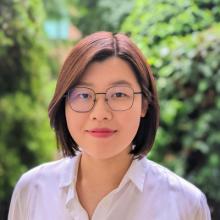Nancy Lin
Why did you decide to pursue a graduate degree?
I am a clinical social worker who has practiced for over half a decade across the healthcare continuum, including in rehabilitation settings with people with acquired brain injury and their loved ones. I provide psychosocial supports for people who experience adjustment difficulties after their injury. I have found that those with the most severe disabilities have some of the highest levels of psychosocial maladjustment, but are also the least likely to benefit from conventional approaches to psychosocial support. As such, I have lived experience of providing the very supports that this population cannot access due to their diverse abilities.
It is through this experience of practicing in an area with a dearth of research and witnessing the lack of meaningful support for clients that inspired me to seek better solutions. The desire to achieve psychosocial well-being for people of all abilities was what led me to pursue doctoral studies with a research focus on enhancing psychosocial support accessibility for people with acquired brain injury-related disability.
Why did you decide to study at UBC?
I also obtained my Bachelor and Master degrees at UBC. UBC is internationally recognized as an institution that values academic excellence, innovation in research, and transformative learning. The rigour of the education that I received and the lasting academic relationships that I have built throughout my previous degrees strongly contributed to my decision to return to UBC for my doctoral degree. UBC’s exceptionally high standards for academic achievement shaped me into the clinician that I am today, and learning from UBC’s outstanding instructors inspired me to strive towards the scholar I want to become in the future.
What is it specifically, that your program offers, that attracted you?
My research objectives align precisely with the values of the UBC School of Social Work: to promote social equity and the right to human dignity for all individuals, without leaving any one person behind. With the School’s fundamental focus on social justice and an ethic of care, I felt this was the perfect learning environment to nurture my aspirations of engaging in scholarship to advance a just society.
What was the best surprise about UBC or life in Vancouver?
I was born and raised in Vancouver, so I have had the immense privilege of enjoying the sea, mountains, and forests here all my life. Even then, the natural, breathtaking beauty of this land never gets old. Vancouver’s abundance of quality cuisines from all around the world is also second to none.
What aspects of your life or career before now have best prepared you for your UBC graduate program?
My years of practicing as a clinical social worker in a variety of healthcare settings and with diverse client groups led me to develop a deep appreciation for the practical and ethical complexities of serving marginalized populations. This first-hand experience serves as the foundation and inspiration for my scholarship, which means that there is never a shortage of questions to answer and gaps to fill. With the abundance of institutional resources at our disposal in the academy, the potential for researchers to contribute to wider social needs are just about limitless.
What do you like to do for fun or relaxation?
No matter how busy things get, I do my best to maintain a good work-life balance. When I want to relax, I go for walks with my dog (a toy poodle named Emmy), try new restaurants around town, watch anime, and take lots of naps.
What advice do you have for new graduate students?
Maintain an open mind, be curious about everything, and dare to challenge established ways of knowing. Building a collaborative and communicative relationship with one’s graduate supervisor is also one of the most enriching parts of being a graduate student.
